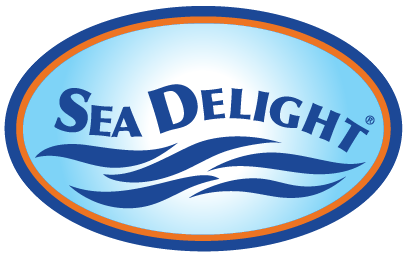responsible SEAFOOD POLICY
Sea Delight is committed to ensuring seafood remains a secure resource for future generations to enjoy. We use our buying power and position in the seafood industry to employ and promote responsible practices globally. Our own principles, including strategic sourcing and research, leverage positive change in our suppliers and customers.
Our informed choices are strengthened by establishing transparency in our supply chains and collecting data so we can eliminate illegal, unreported and unregulated (IUU) seafood from our supply. We educate our employees, suppliers, and customers with this information to create a more conscious industry.
We extend our commitment beyond our own practices and across commercial, governmental, and civil sectors. We engage in advocacy, education, and direct investment through the funding of and participation in fishery improvement projects (FIPS). These FIPs improve the environmental, economic, and social aspects of fisheries and communities across the world.
Our SUSTAINABLE SEAFOOD POLICY is the foundation for Sea Delight’s future business and will send a ripple of positive change through the seafood industry. The following outlines how this policy is put into action:
Commitment & Sourcing Strategy
Environmentally responsible seafood is fished or farmed in a way that safeguards future seafood supplies while minimizing impacts on surrounding ecosystems. Sea Delight preferentially sources and sells environmentally responsible seafood and aims to increase the percentage of products offered from fisheries and farms that improve environmental performance over time.Our objective is to procure all of our frozen and fresh seafood products from responsible sources by 2030. Sea Delight is committed to sourcing their products from fisheries and farms that are:
Rated by credible independent bodies such as Monterey Bay Aquarium Seafood Watch, Vancouver Aquarium Ocean Wise, and SeaChoice
Certified by eco-certifications benchmarked and recognized by the Global Sustainable Seafood Initiative (GSSI).
In credible Fishery and Aquaculture Improvement Projects (FIPs & AIPs) that are publicly reporting.
Sea Delight does not require products be eco-certified, but requires products to meet Sea Delight criteria for food safety and quality. If eco-certifications are available, all relevant certification information will be documented.
Data Collection, Assessment, and Reporting
Sea Delight works closely with suppliers to collect detailed information needed to assess the sustainability of seafood products procured and sold by the company. Specific information collected includes, but is not limited to:
Common and scientific names
Country of origin, FAO fishing area, and region of catch
Wild or farmed designation
Fishing gears or aquaculture production methods used
Producers and/or processors
Volume of product purchased
Eco-certification (MSC, BAP, ASC, etc.)
Supporting documentation for fishery improvement projects (e.g. workplan, timeline, budget, progress report, etc.)
Sea Delight works towards assessing and monitoring our sourcing data to track milestones and impacts over time. This analysis will identify species/products suitable for targeted improvement and/or promotion.
Sea Delight is committed to providing customers with credible sustainability information regarding its seafood products and to provide a summary of the company’s sustainability progress annually. Furthermore, Sea Delight continuously improves company systems to trace seafood back to its harvest location and to ensure the legality of seafood product.
Fisheries Improvement
Sea Delight is committed to supporting and improving its source fisheries through a variety of actions, including:
Creation of FIPs for source fisheries
Direct implementation of FIP activities
Financial contribution to FIPs
Employing on-the-ground staff to coordinate FIP activities
Working with Sea Delight suppliers to improve fishery practices and overall fishery performance
Reform and Advocacy
Sea Delight believes that making internal improvements to its supply chains are an effective way to generate reform within the seafood industry. Improvement areas include data collection, traceability systems, reporting, and supplier engagement. Whenever possible, Sea Delight will advocate for legitimate efforts to strengthen fisheries policy and management to improve environmental outcomes in source fisheries and beyond.
Education
Sea Delight trains employees on seafood sustainability and fishery improvement efforts so staff may confidently assist customers in selecting environmentally responsible seafood. Sea Delight is committed to working with suppliers in its supply chain to improve fishing practices through training, workshops, and educational materials. Sea Delight increases public and industry awareness about seafood sustainability by hosting supporting events in support of marine conservation and sustainability.
Partnerships
Sea Delight actively engages all stakeholders to improve the sustainability of its seafood supply. Sea Delight partners with multiple NGOs to address different aspects of seafood sustainability. Sea Delight currently partners with World Wildlife Fund (WWF) and CeDePesca to work on-the-ground with suppliers for the improvement of source fisheries.





